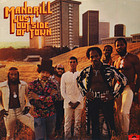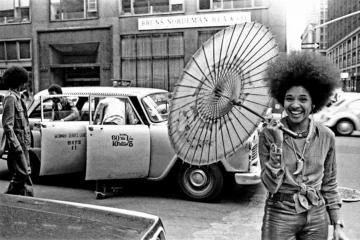Who doesn’t know the scene from the movie “Forrest Gump”? After a long night out, Forrest is sitting on a park bench with his record case and tells a perfect stranger, “My mom always said life was like a Mandrill record. You never know what you gonna get.” Well, sort of how it would have gone if Forrest hadn’t been such a sucker for chocolates and calendar mantras instead. Anyway, he would have made a valid point with that. Because when Mandrill released their fourth album, “Just Outside Of Town,” in 1973, the law of the genre album did not yet apply. The distinction between styles was permeable, genre-fluid so to speak.
Constant flux
Instead of working off a style that would have kept the album self-contained and sold well slice by slice to the supposedly homogeneous target group, Mandrill changed horses every other minute. On »Just Outside Of Town«, driving Latin Funk is followed by flawless hippie Pop, by sugar-sweet Motown Soul, by Afro-Caribbean-divided Hard Funk, by pure Blaxploitation sex, by country-esque Rock opera ballad, by cinematic Jazz meditation. And in the middle explodes a fuzzy bass monster that facilitated one of the fattest Hip Hop anthems ever. Sometimes – like on »Mango Meat« or »Fat City Strut« – they even change horses midstream and unannounced.
For Mandrill, it couldn’t have been any other way. The band’s members embodied what White Supremacists have been wetting themselves about at night both then and now: liberated, fresh, lighthearted, and self-evident diversity. Latin, Black, White. “One Nation Under A Groove” would have been Mandrill’s brand slogan if that hadn’t already been reserved by George Clinton.
Chocolates hodgepodge without nougat
Of course, this variety was no exception in 1973. Funk and Soul albums always were a bit of a family box of chocolates. Unfortunately, most of the time they promised a colorful and consistently delicious assortment on the back. While hiding only far too many sticky nougat offcuts behind their fancy names. In fact, this approach rarely worked out very well. Nerd DJs who wouldn’t even touch Funk compilations with pliers and instead chase after the originals will vehemently disagree. Understandable! Anyone who has spent hundreds of dollars on a single record is beyond the point of no return of nougat brainwash. However, usually 70% of the material on the original Funk and Soul albums was just flat out dull.
Everything fits, nothing wobbles or tastes like a forced imitation for the charts people.
The fact that Mandrill didn’t fall into this pattern was probably precisely thanks to their diversity, pinpoint accuracy, and the fun they had with throwing all styles in the mixer. All influences were captured, embraced, and meshed together, so that every song trips up with a laugh every now and then. On »Mango Meat,« the opening bobbing Bossa horns slide unexpectedly into a fractured, bone-dry Funk that picks up rocking speed for the chorus, only to settle down very slowly in the fade-out, as if it had nothing to do with all the previous hullabaloo.
In addition, the pieces are almost perfectly worked out and arranged. Everything fits, nothing wobbles or tastes like a forced imitation for the charts people. The soul remains because that’s exactly how the band was (and still is). Even the country-esque Rock opera “She Ain’t Lookin’ Too Tough” unfolds its crooning effect, though a slight cringe effect can’t be denied.

Just outside of town
The Bomb in the middle
And then, of course, there is »Two Sisters Of Mystery« – as the centerpiece of the album, the surprise egg and the most brutal thing that Funk has ever produced. Only Public Enemy, Psycho Realm and Renegade Soundwave have dared to sample it so far. Except for Public Enemy’s vocally powerful Chuck D., all are drowned in the punching of Neftali Santiago’s dragged drums and Frederick »Fudgie Kae« Solomon’s mercilessly roaring fuzzy bass. »Two Sisters Of Mystery« is the uber track that alone seals the album’s purchase. Because – and this is a conspiracy that to this day even the most perceptive QAnon swashbucklers (hello, anyone home?) are biting their fingernails at – »Two Sisters of Mercy« hasn’t appeared on a single Funk break compilation in 30-odd years, not even the illegal ones.









